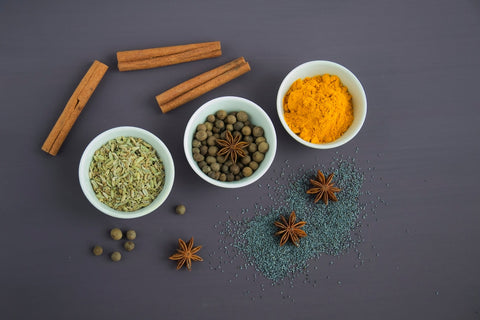
By Brittany Risher
For as long as there's been sex, people have searched to find ways to make it better—more pleasurable, longer, with better orgasms, you name it. Enter aphrodisiacs. Derived from “Aphrodite” (the name of the Greek goddess of love), this term refers to substances that stimulate sexual desire. And while there isn't much scientific proof behind most aphrodisiacs, you still find couples ordering oysters on Valentine's Day in the hopes they'll get lucky. So let's take a look at the history of aphrodisiacs and if you should consider trying any.
How did aphrodisiacs get their reputations?
The Greeks, Chinese, Romans, Egyptians, Indians, and others have long histories of using aphrodisiacs. Here's what we know about the background of some of the more common aphrodisiacs.
1. Oysters
Rumor has it, Casanova slurped down 50 raw oysters every morning to maintain his virility. Others say oysters became aphrodisiacs because they resemble female genitalia, so somehow eating them boosts libido. Today, we know oysters contain zinc, a mineral men need for normal sperm function and fertilization. But that's probably the most they have going for them.

2. Damiana herb
Damiana is a shrub native to Mexico and Central America. Mayans took the leaves to make a tea they drank as an aphrodisiac. They may have been on to something, as one study found that damiana helped treat sexually exhausted rats. Plus some say the flavonoids in damiana are similar to those in yohimbine, an herb used to treat erectile dysfunction. If you wish to give it a try, you can find damiana in tea and supplements.

3. Maca
You may have heard of maca thanks to some christening it as a “superfood”. Maca only grows in the Andes, where natives have used it to boost people's (and animals') fertility for centuries. The root is dried and ground into a powder, which you can add to teas, smoothies, baked goods, and more. Consuming maca may increase sperm concentration and motility, possibly enhancing fertility.

4. Ginseng
Emperor Shen-Nung—China's second mythical emperor who's considered the father of Chinese medicine—recommended ginseng to treat erectile dysfunction and increase sexual desire. He believed that the root had aphrodisiac properties because it resembled the human form—and the more it looked like the human figure, the more potent the root was. Although that's highly questionable, some research has found that Korean red ginseng may increase erectile function in men.

5. Chocolate
While Casanova had oysters, Montezuma had chocolate. The Aztec emperor supposedly drank large quantities of a bitter chocolate beverage before spending time with his women. Spanish conquistadors brought cocoa back to Europe, where eventually King Louis XV’s mistresses reportedly drank the beverage to get in the mood. However, no science supports this practice.
Are there any risks to trying aphrodisiacs?
For the most part, consuming something that's considered an aphrodisiac will not harm you. However, be cautious. Spanish fly (made from drying and crushing a blister beetle) can cause poisoning and even be lethal, so it's best to avoid.
For any other herb, vitamin, or mineral, be aware that the FDA doesn't regulate supplements the way it regulates drugs. Companies can sell supplements without any approval or safety testing by the FDA. That's why you often see the disclaimer “This statement has not been evaluated by the Food and Drug Administration. This product is not intended to diagnose, treat, cure, or prevent any disease" on the labels.
The only way to know that you're buying a safe, quality product is to look for brands with a seal of approval from a third-party company. Ones to trust are NSF International, U.S. Pharmacopeia (USP), Informed Choice, and Consumer Lab. Any of those seals indicates that the product contains what it says it does, at the level it says it does, and doesn't contain harmful levels of contaminants.
If most aphrodisiacs aren't scientifically proven... then why do people use them?
Even though the research is light, many of us are curious about aphrodisiacs. Some people are duped by good marketing that promises mind-blowing sex if you take X supplement. And, no matter what science says about aphrodisiacs, you can't discount the placebo effect. If you have a piece of chocolate and you think it'll lead to more stamina in the sack, well, you just might find you can go for another round or two.

What alternatives to aphrodisiacs might work?
If you'd prefer to try other ways to increase your sexual desire, there's plenty of fun things to try. Doing anything sexual will make you want to be more sexual. So don't overlook masturbation, reading erotica, and watching porn. Making time for foreplay also helps lower inhibitions and gets your blood flowing, so your body is more primed for sex—all of which can lead to better sex. Lastly, if your libido is low and it's stressing you out, consider talking to a doctor whom you trust, as there could be an underlying health problem. Once that's identified, you can find ways to remedy the issue.
===
Discover what turns you on with Lioness Vibrator.
 Using built-in sensors and an intuitive mobile app, Lioness lets you visualize your arousal and orgasms. Simply use Lioness like any other vibrator, then review the results on your phone. Soon, you’ll begin to understand how your body responds – and how to make every climax stronger and more enjoyable.
Using built-in sensors and an intuitive mobile app, Lioness lets you visualize your arousal and orgasms. Simply use Lioness like any other vibrator, then review the results on your phone. Soon, you’ll begin to understand how your body responds – and how to make every climax stronger and more enjoyable.
Our woman-led design team has dedicated YEARS to improving your pleasure, and we can’t wait for you to experience Lioness for yourself.
Click here to learn more.


